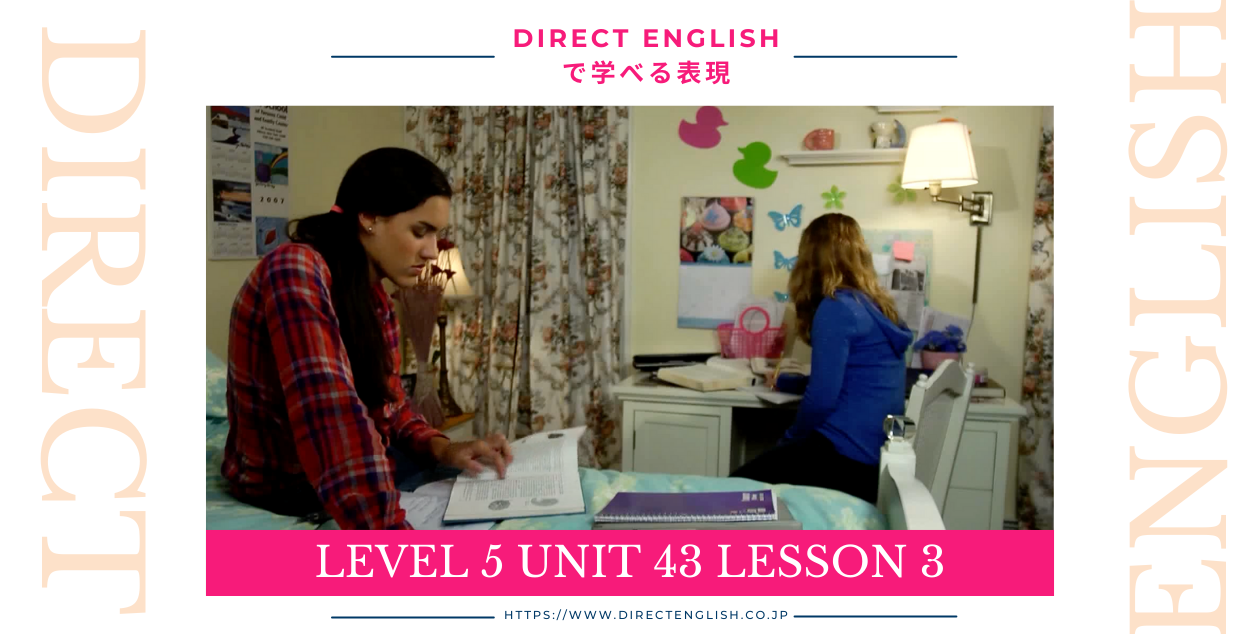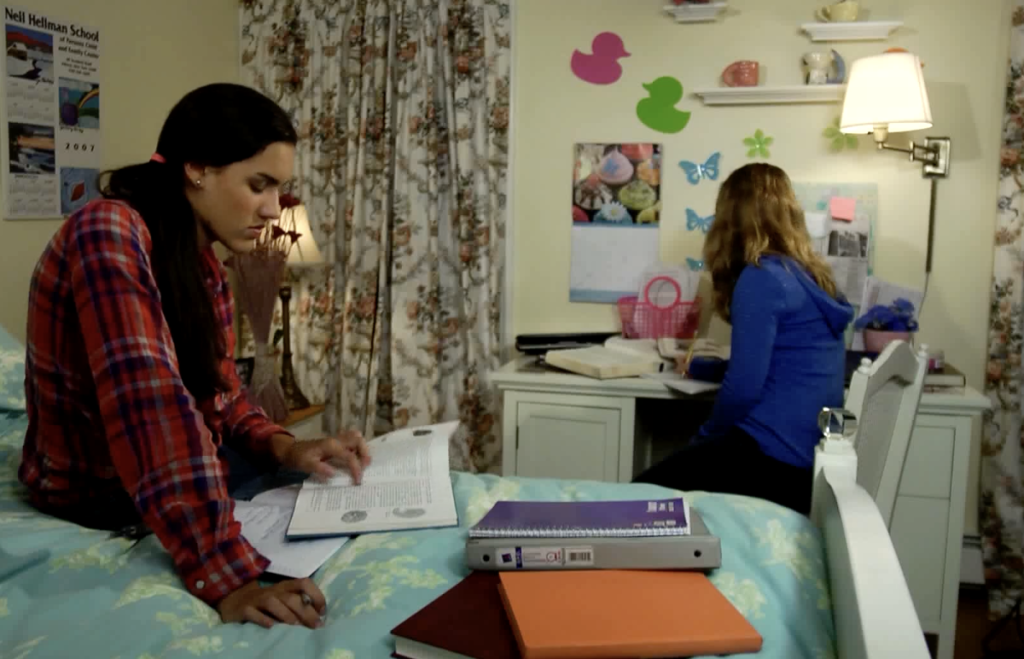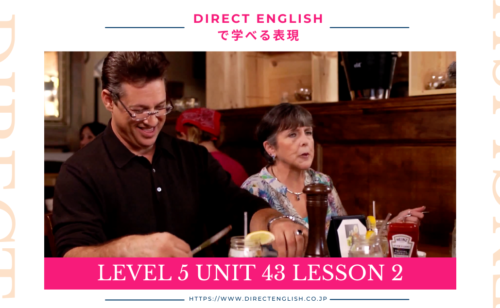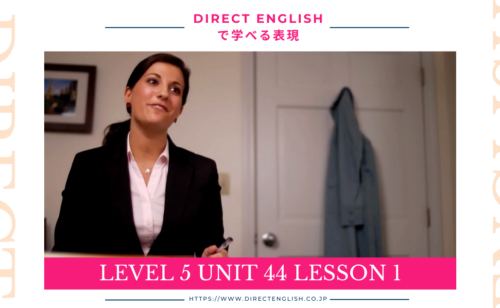
今回のレッスンでは、BethとJustineが勉強しながら会話する様子を通じて、学習や友情について学びます。Justineは生物学の試験でBethにカンニングを頼むと同時に、科学が苦手であることを話し、BethはJustineを励まします。また、Justineは大学の要件についても不満を述べます。
1. レッスン3の概要と登場人物
BethとJustineが勉強しながら会話する様子です。Justineは生物学の試験でBethにカンニングを頼むと同時に、科学が苦手であることを話し、BethはJustineを励まします。また、Justineは大学の要件についても不満を述べます。

Situation:
Beth and Justine are doing their homework.
Question:
How does Justine interfere with Beth’s desire to study?
2. 会話で使われた重要なフレーズと実践的な例文
- 1. Would you mind if I cheated off you on the biology test?
-
意味:生物学の試験であなたの答えをコピーすることを許してくれますか?
解説:「Would you mind if」は丁寧に許可を求める表現で、「cheated off you」は「他人の答えをコピーする」という意味です。
例文:Would you mind if I borrowed your notes?
(あなたのノートを借りることを許してくれますか?) - 2. Get a life.
-
意味:もっと充実した生活をしろ。
解説:命令文で、「人生を手に入れろ」という直訳ですが、実際には「そんなことにこだわるな」という意味で使われます。
例文:Stop complaining about everything. Get a life!
(全てについて文句を言うのをやめろ。もっと充実した生活をしろ!) - 3. I’m going to flunk it.
-
意味:私は失敗するだろう。
解説:「I’m going to + 動詞の原形」は未来の意思や計画を表し、「flunk」は「失敗する」や「落第する」という意味です。
例文:I’m going to flunk this course if I don’t start studying.
(私はこのコースで失敗するだろう。勉強を始めなければ。) - 4. Who cares?
-
意味:誰が気にするの?
解説:疑問文の形をしていますが、実際には反語的に使われ、「誰も気にしない」という意味になります。
例文:Who cares if we’re a little late?
(私たちが少し遅れたとしても誰が気にするの?) - 5. You’re lucky. You understand science.
-
意味:あなたは運がいい。科学を理解することができる。
解説:「You’re lucky」は「あなたは運がいい」という意味で、「You understand science」は「あなたは科学を理解することができる」という意味です。
例文:You’re lucky. You have a great job.
(あなたは運がいい。素晴らしい仕事を持っている。) - 6. You get it right away.
-
意味:あなたはすぐにそれを理解する。
解説:「You get it」は「あなたはそれを理解する」という意味で、「right away」は「すぐに」を指します。
例文:You understand the instructions right away.
(あなたは指示をすぐに理解する。) - 7. Who gets me through Spanish?
-
意味:誰が私をスペイン語で助けてくれるの?
解説:「Who gets me through」は「誰が私を~で助けてくれるの」という意味です。「Spanish」は「スペイン語」を指します。
例文:Who helps me get through math exams?
(誰が私を数学の試験で助けてくれるの?) - 8. Just because colleges have these stupid requirements, we have to take subjects that we hate.
-
意味:大学がこれらの馬鹿げた要件を持っているからといって、私たちは嫌いな科目を取らなければならない。
解説:「Just because」は理由を述べる表現で、「have these stupid requirements」は「馬鹿げた要件を持っている」という意味です。「we have to take subjects that we hate」は「嫌いな科目を取らなければならない」という意味です。
例文:Just because it’s raining, we can’t go out.
(ただし雨が降っているからといって、私たちは外に出られないわけではない。) - 9. There isn’t anyone who loves every subject.
-
意味:すべての科目を愛する人は誰もいない。
解説:「There isn’t anyone who + 動詞」は「~する人は誰もいない」という意味です。「loves every subject」は「すべての科目を愛している」という意味です。
例文:There isn’t anyone who can do it perfectly.
(それを完全にできる人は誰もいない。) - 10. I talked to somebody you know last night.
-
意味:昨夜、あなたが知っている誰かと話した。
解説:「I talked to + 人 + 時間の表現」は「昨日、あなたが知っている誰かと話した」という意味です。「somebody you know」は「あなたが知っている誰か」という意味です。
例文:I met someone you used to work with.
(あなたと以前一緒に働いていた誰かと会いました。) - 11. We can discuss it some other time.
-
意味:それについては別の時に議論しましょう。
解説:「We can + 動詞の原形」は「私たちは~できる」という意味で、「discuss it」は「それについて議論する」という意味です。「some other time」は「別の時に」という意味です。
例文:We can talk about it later.
(それについては後で話しましょう。)
3. 「My Favorite School Subjects」というテーマで、短いエッセイを書いてみましょう。
ライティングのコツと準備方法
- 主題を決める:例えば「好きな学校の科目」
- アウトラインを作成:主要なポイントを箇条書きにする
- 具体的な詳細を考える:好きな科目とその理由、嫌いな科目とその理由
- 学んだ表現を組み込む:レッスンで学んだフレーズを使用する
- 感情や雰囲気を描写する:読者が情景を想像できるようにする
ライティング見本
Title: My Favorite School Subjects
I have always enjoyed certain subjects in school more than others. Among my favorites are English, History, and Art. English is fascinating because I love reading literature and analyzing different texts. History is another favorite subject because it allows me to learn about past events and how they shaped our world. Art is great because it gives me the freedom to express myself creatively.
On the other hand, I have struggled with subjects like Mathematics, Chemistry, and Physics. These subjects require a lot of problem-solving and memorization, which can be overwhelming at times. However, I believe that studying a variety of subjects is important for becoming a well-rounded individual. Even if you don’t like a subject, learning it can teach you valuable lessons about perseverance and problem-solving.
In conclusion, while I have my preferences, I understand the importance of a broad education. I hope to continue exploring my interests while also challenging myself in areas where I struggle.
まとめ
このレッスンでは、BethとJustineの勉強会話を通じて、学習や友情について学びました。学んだ表現を使って、自分の学習体験や友人との関係について話してみましょう。例えば、「Would you mind if I borrowed your notes? You’re lucky. You understand science quickly.」(あなたのノートを借りることを許してくれますか?あなたは運がいい。科学をすぐに理解することができる。)のように使えます。て英語で語り合ってみましょう。

